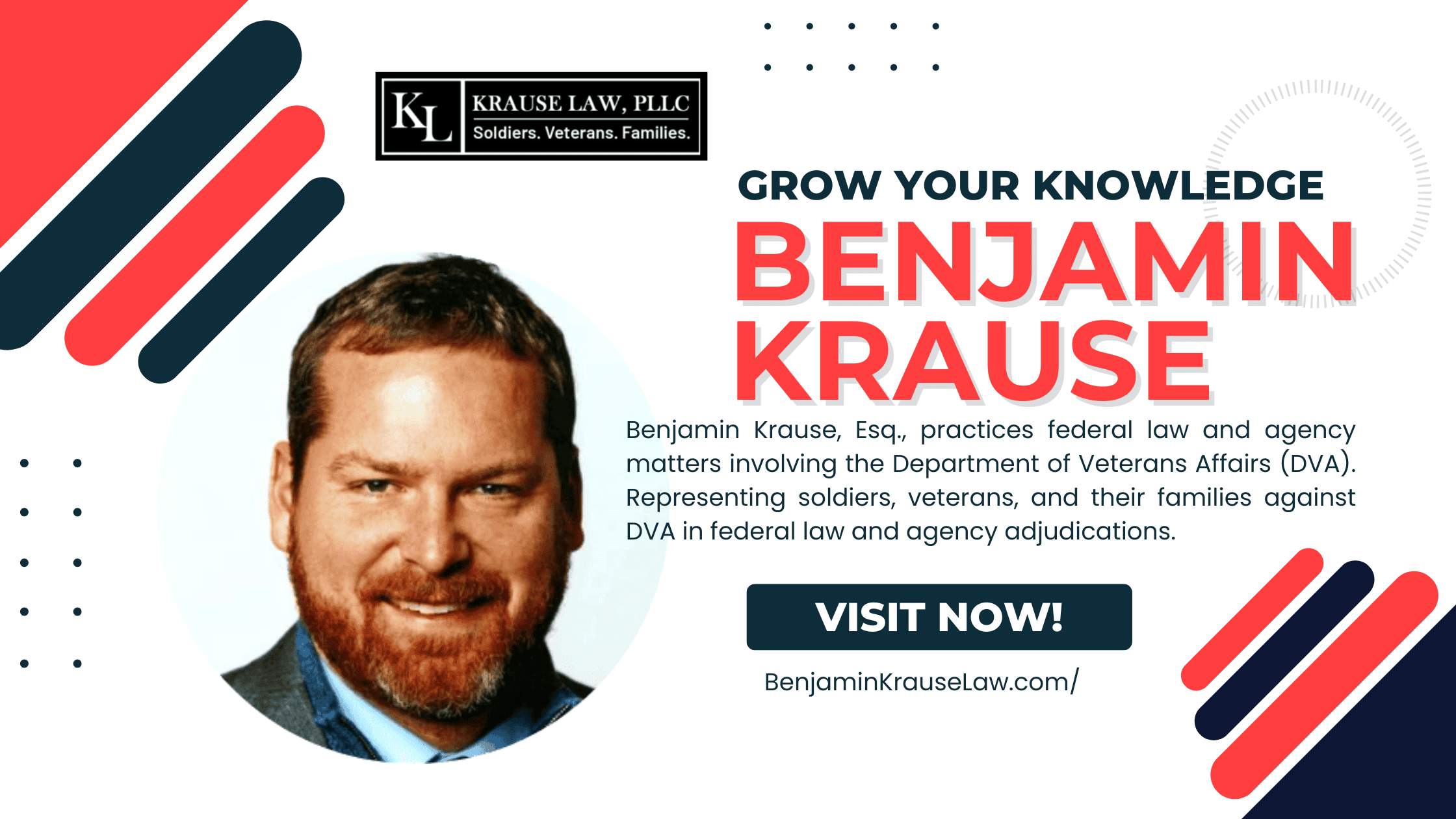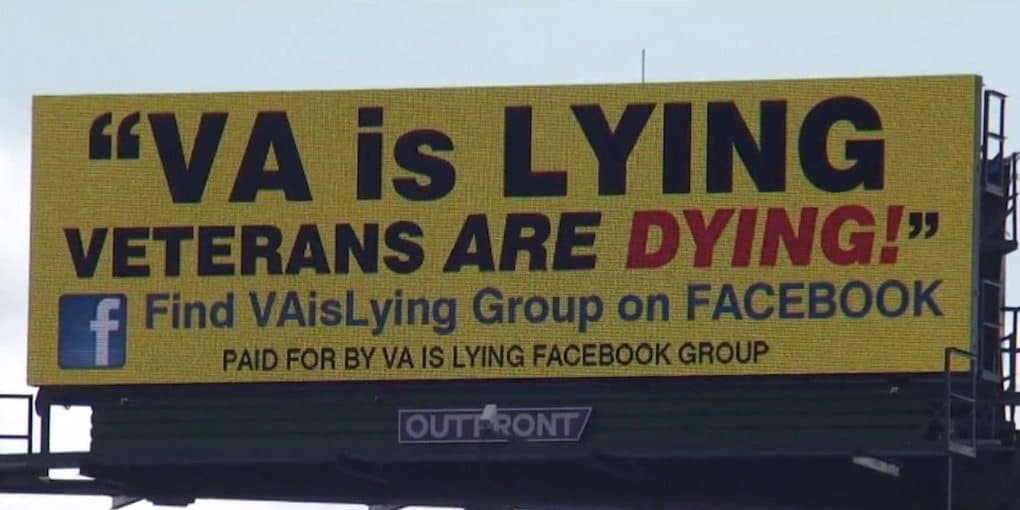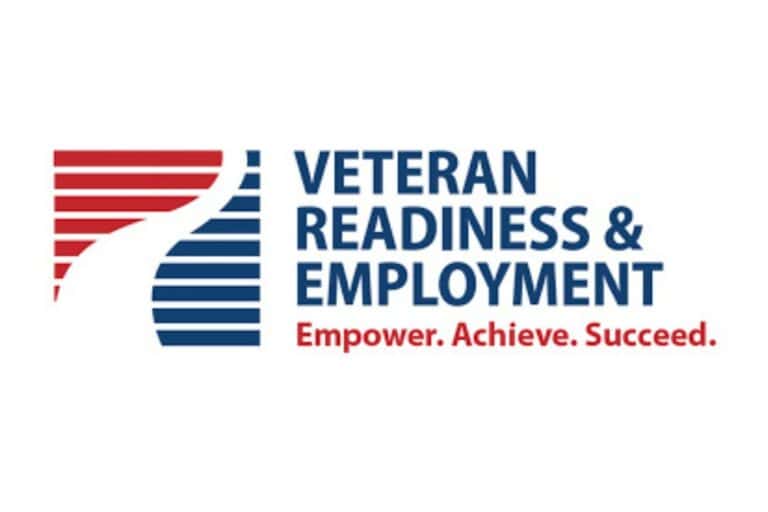The Struggles of Disabled Vets: Employment Challenges and Solutions
Disabled veterans encounter a myriad of significant challenges as they navigate their return to civilian life, with one of the most critical and immediate obstacles being employment. Transitioning from a military career to a civilian one is often an intricate and complicated process. For disabled veterans who have been discharged from active duty, this process becomes even more challenging due to the added layers of difficulty brought on by their disabilities, compounded by societal misconceptions and systemic barriers that prevent equal opportunities. These veterans not only face the personal struggles of adapting to their new circumstances but must also contend with a labor market that can be unwelcoming or unaccommodating to their unique needs and valuable skill sets.
Employment concerns among disabled veterans highlight a persistent issue that demands attention, as it directly impacts their ability to reintegrate into society and achieve financial stability. Despite their dedication and sacrifices during military service, disabled veterans often find themselves fighting an uphill battle when seeking civilian employment. Beyond physical or psychological disabilities, they frequently face prejudice rooted in a lack of understanding about the value they bring to the workforce. The transition itself involves overcoming systemic hurdles, such as navigating a civilian job market that may overlook or undervalue their military experience and qualifications. These intersecting challenges leave many disabled veterans struggling to find meaningful employment opportunities, which can in turn affect their overall well-being and sense of purpose after service.
In search of effective ways to address this pressing issue, it is essential to turn to individuals like Attorney Ben Krause, who brings both expertise and a personal commitment to improving the lives of veterans. As a veteran himself, Krause understands the unique struggles faced by this community, and he has dedicated his practice to helping those who have served the country overcome these kinds of barriers. By leveraging his experience and knowledge, he offers disabled veterans much-needed guidance in navigating complex systems and finding solutions that empower them to secure employment and achieve success in civilian life. This article aims to take a closer look at the employment challenges disabled veterans face and explore how the work of advocates like Attorney Krause provides a pathway toward viable and lasting solutions.
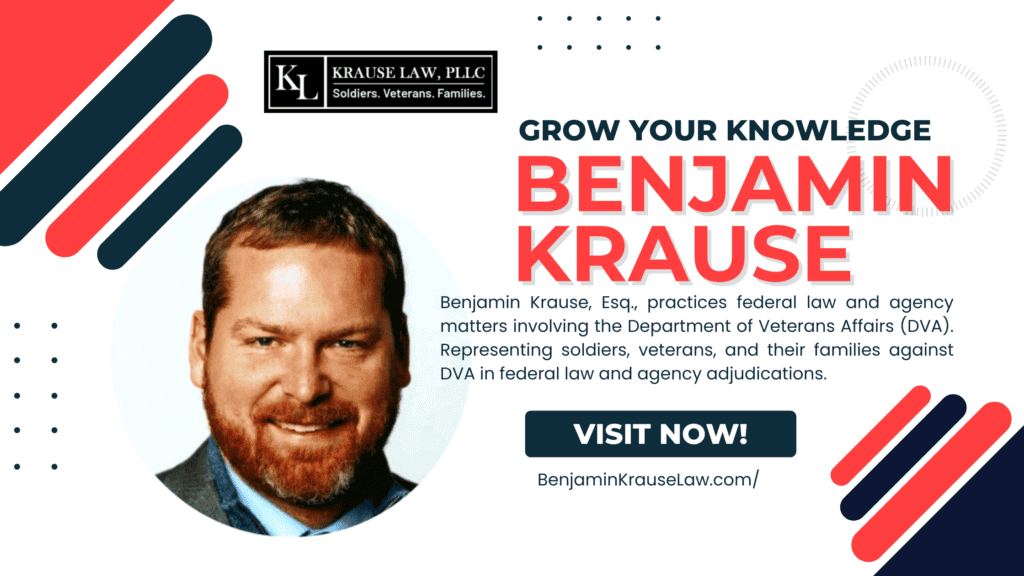
The Employment Struggle
Employment Barriers
For many disabled veterans, the journey to finding suitable employment is riddled with challenges:
Discrimination: Discrimination can occur when employers hold preconceived ideas or biases about the abilities and potential of disabled veterans. These assumptions may cause them to undervalue the skills and contributions that such individuals could bring to a workplace. As a result, these biases can lead to unfair and discriminatory hiring practices, where disabled veterans are overlooked for opportunities or judged more harshly compared to other candidates. Such actions reflect a lack of understanding and acknowledgment of the value that disabled veterans are capable of providing in professional environments
Skill Transition: Transitioning military skills into civilian job markets can often prove challenging, which may result in many veterans feeling ill-equipped or underprepared when trying to enter the workforce. The process of identifying how their military expertise aligns with the requirements of civilian roles can be complex and overwhelming, leaving some vets uncertain about how to navigate this significant career shift effectively.
Mental Health Issues: Post-Traumatic Stress Disorder (PTSD) and various other mental health conditions can have a significant impact on an individual’s ability to perform effectively in the workplace. These challenges may reduce productivity, affect professional relationships, and make it difficult to meet job expectations, ultimately limiting employment opportunities and career progression.
These barriers not only affect the financial stability of disabled veterans but also take a toll on their self-esteem and overall quality of life.
Translating Military Skills to Civilian Jobs
Translating military skills to civilian jobs can be a daunting task for many veterans, but numerous resources are available to assist in this transition. The Department of Veterans Affairs (VA) offers a range of tools and services designed to help veterans align their military experience with civilian career opportunities.
One such resource is the VA’s CareerScope assessment tool, which helps veterans identify their strengths and interests, matching them with potential civilian careers. This tool also provides valuable insights into job market trends and the necessary education and training for various roles.
The Disabled Veterans National Foundation (DVNF) Career Center is another excellent resource, offering career counseling, resume building, and job placement services specifically for disabled veterans. The DVNF Career Center also provides training and certification programs in high-demand fields such as IT, healthcare, and manufacturing.
Additionally, the Occupational Information Network (O*NET) serves as a comprehensive database of occupational skills, knowledge, and other characteristics. This resource can help veterans identify civilian careers that closely match their military experience, making the transition smoother and more strategic.
Many employers also offer programs and services tailored to help veterans transition to civilian careers. These may include mentorship programs, job training, and education assistance, all aimed at helping veterans develop the skills and experience needed to succeed in the civilian workforce.
Key Takeaways:
The VA offers various tools and services to help veterans translate their military skills to civilian careers.
The CareerScope assessment tool helps veterans identify their strengths and interests and match them with civilian careers.
The DVNF Career Center provides career counseling, resume building, and job placement services specifically for disabled veterans.
O*NET is a comprehensive database that helps veterans identify civilian careers matching their military experience.
Many employers offer programs and services to help veterans transition to civilian careers.
Financial Implications
The financial burden placed upon disabled veterans due to such disability can be incredibly overwhelming and all-encompassing. Many of these veterans experience significant challenges as they grapple with mounting medical expenses, ongoing rehabilitation costs, and additional financial pressures stemming from the need to provide for their families, often in the absence of stable, reliable employment. These hardships can create a cycle of financial instability and stress that is difficult to escape. Adding to this already difficult situation, the costs involved in caring for disabled veterans have been steadily increasing over time. These costs, which include critical medical care and support services, are currently on the rise and are expected to double in the years to come. This projected increase has sparked growing concerns about whether current systems of support will be able to sustain the growing demand. The future of programs designed to assist disabled veterans and their families may be called into question as these rising expenses continue to place immense pressure on available resources.
A Critical Look at Current Support Systems
Although there are a number of federal government programs designed to assist disabled veterans, many of these initiatives face significant challenges that limit their effectiveness. A common issue is that these programs are often underfunded, which reduces their ability to meet the needs of those they aim to serve. Additionally, the execution of these programs is frequently flawed, leading to further difficulties for disabled veterans seeking support. For instance, long waiting times for receiving benefits are a persistent problem, leaving many veterans without timely access to the assistance they require. The application processes for these programs are also frequently confusing and overly complex, creating unnecessary barriers for individuals who are already facing significant challenges. Furthermore, insufficient outreach efforts mean that many disabled veterans may not even be aware of the resources available to them, further exacerbating their struggles to access the help they need. These combined issues contribute to the ongoing hardships faced by disabled veterans and highlight the need for improvements in how these programs are funded, managed, and promoted.
A Solution: Reach Out to Attorney Ben Krause
Disabled veterans often face a myriad of challenges, making it essential for them to seek expert guidance to address these pressing issues effectively. Navigating the complexities of veteran benefits and employment law can be overwhelming, and having an experienced advocate by their side is key. Attorney Ben Krause, who is a veteran himself, has dedicated his career to supporting fellow veterans in overcoming these difficulties. With his firsthand experience and deep understanding of the unique hurdles disabled veterans encounter, he is especially equipped to provide valuable legal assistance.
Ben Krause uses his extensive knowledge to guide veterans through the often confusing and intricate processes required to secure the benefits and rights they are entitled to. His dedication stems from a commitment to ensuring that disabled veterans receive not only the support they need, but the respect they have earned through their service. By tailoring his legal services to the specific needs of each individual, he works diligently to help veterans achieve the outcomes they deserve. Whether addressing benefit claims or navigating employment-related concerns, his skilled guidance offers veterans a reliable path forward in overcoming challenges and obtaining rightful support.
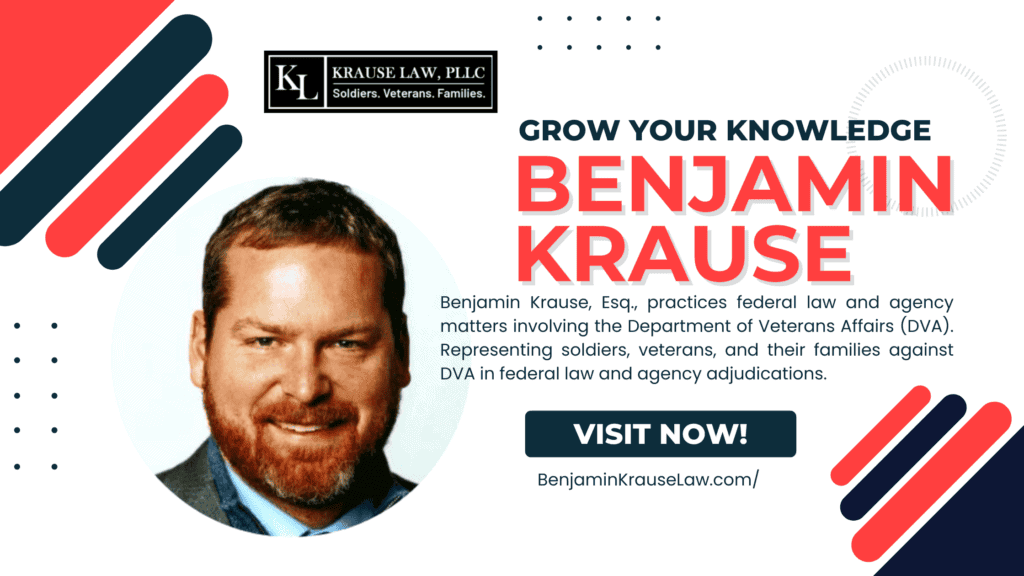
How Attorney Ben Krause Can Help
Legal Representation: Ben Krause provides dedicated legal representation for veterans with service-connected disabilities who are pursuing disability benefits, working tirelessly to ensure that their rights are upheld and their voices are heard throughout the process. His commitment is to help veterans navigate the system effectively while protecting their rights and securing the benefits they deserve.
Navigating Employment Law: Navigating the complexities of employment law, he is well-equipped to assist disabled veterans in addressing workplace discrimination claims. He can offer valuable guidance throughout the process, ensuring they understand their rights, and he provides dedicated advocacy to help protect those rights within the employment sector. With his support, disabled veterans can feel empowered to challenge discriminatory practices and seek the fair treatment they deserve in their professional environments.
Resources and Support: Ben offers a variety of resources and support to assist veterans in their career journeys. He provides access to tools, programs, and opportunities specifically designed to help veterans enhance their existing skills and develop new ones. These resources are aimed at empowering veterans to gain the competencies they need to succeed in today’s job market. Ben also helps connect veterans with employment opportunities that align with their abilities and career goals, ensuring they can find suitable positions where they can thrive and grow professionally.
Conclusion
Disabled veterans face numerous and complex challenges, especially when it comes to achieving stable and meaningful employment. These difficulties often result from a combination of barriers, such as physical limitations, mental health struggles, and societal misconceptions, making it an uphill battle for many. Despite these significant obstacles, there is hope and support available for those willing to seek the right guidance. By connecting with knowledgeable professionals, like Attorney Ben Krause, disabled veterans can access personalized help and advocacy to navigate these tough situations. Legal expertise and dedicated support from experienced individuals ensure that veterans stand a better chance of overcoming these barriers and reaching their goals. Together, with the right tools and strategies, it is possible to work towards a brighter future for those who served. A future where all veterans, regardless of the challenges they face, are granted the respect, care, and opportunities they so rightfully deserve, remains an achievable goal.
Essential Resources for Disabled Vets: Benefits and Support Options
Understanding Disability Benefits
Service-Connected Disability
A service-connected disability is a disability that was incurred or aggravated in the line of duty in the active military, naval, air service, or space service.
To be eligible for disability compensation, a veteran must have a service-connected disability rating of 10% or more.
The disability rating is determined by the Veterans Affairs (VA) and is based on the severity of the disability.
A service-connected disability can be physical or mental, and can include conditions such as post-traumatic stress disorder (PTSD) and traumatic brain injury (TBI).
Veterans with a service-connected disability may be eligible for disability compensation, vocational rehabilitation, and other benefits.
Employment Support for Disabled Veterans
Employment Rights and Protections
The Uniformed Services Employment and Reemployment Rights Act (USERRA) is a federal law that protects the employment rights of service members and veterans. The United States Department, through programs like TRICARE, provides health care benefits to service members and their families, distinguishing these benefits from Social Security.
USERRA prohibits employers from discriminating against employees or applicants for employment based on their military status or military obligations.
The Americans with Disabilities Act (ADA) also protects the employment rights of disabled veterans, and requires employers to provide reasonable accommodations for employees with disabilities.
Disabled veterans may be eligible for job accommodations and support, such as vocational rehabilitation and employment assistance.
Job Accommodations and Support
The Job Accommodation Network (JAN) is a free consulting service that provides individualized worksite accommodations solutions and technical assistance for employees with such an impairment, whether it be a physical or mental condition.
The Occupational Information Network (O*NET) is a comprehensive database of occupational skills, knowledge, and other characteristics, including those that veterans bring to the workforce.
Disabled veterans may be eligible for job accommodations, such as modified work schedules, adaptive equipment, and assistive technology.
Employers may also provide support services, such as employee assistance programs (EAPs) and mental health resources.
Benefits and Compensation
Veterans Affairs Benefits
The VA provides a range of benefits and services for disabled veterans, including disability compensation, vocational rehabilitation, and employment assistance.
Disabled veterans may be eligible for VA disability compensation, which is a tax-free monthly payment.
The VA also provides education and training benefits, such as the GI Bill, and home loan guarantees.
Disabled veterans may also be eligible for other benefits, such as healthcare and life insurance.
Social Security Disability Insurance (SSDI)
SSDI is a federal insurance program that provides cash benefits to people with disabilities who have worked and paid Social Security taxes.
Disabled veterans may be eligible for SSDI benefits, which are based on their work history and earnings record.
SSDI benefits are paid monthly, and may be used to support living expenses, medical care, and other needs.
Leave and Time Off
Military Service Leave Entitlement
The Military Service Leave Entitlement is a federal law that provides leave entitlement for employees who are called to active military service.
Disabled veterans may be eligible for leave entitlement, which includes up to 104 hours of leave for medical treatment.
The leave entitlement is a one-time benefit, and may be used during a 12-month eligibility period.
Tax Incentives and Reporting
Tax Incentives for Hiring Disabled Veterans
The Work Opportunity Tax Credit (WOTC) is a federal tax credit that provides incentives for employers who hire disabled veterans.
Employers may be eligible for a tax credit of up to $9,600 for hiring a disabled veteran.
The WOTC is administered by the Department of Labor, and requires employers to complete a certification process.
Resources and Assistance
Finding Job Candidates and Support Services
The VA’s CareerOneStop website provides resources and tools for disabled veterans to find job candidates and support services.
The website includes a job search engine, resume builder, and career assessment tools.
Disabled veterans may also use online resources, such as the Disabled American Veterans (DAV) website, to find support services and job candidates.
